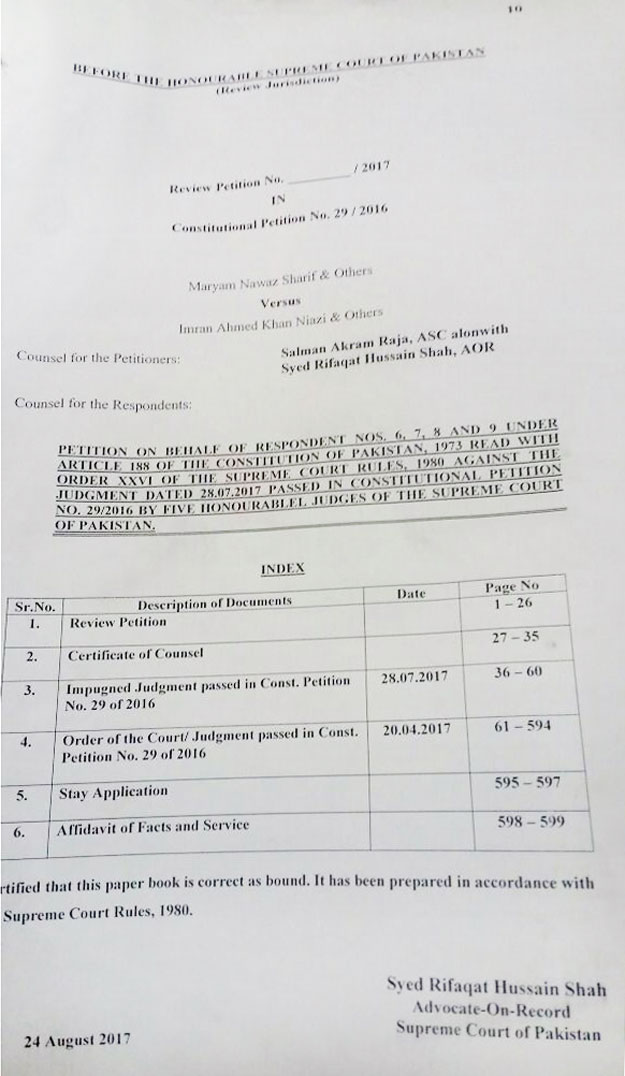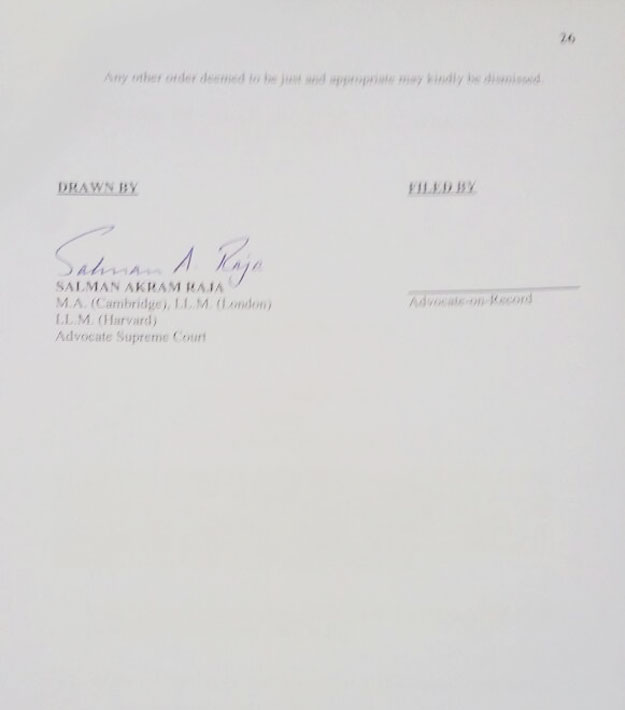Panamagate review petition: Sharif family challenges top court’s jurisdiction
Contends SC cannot oversee accountability court proceedings

From left deposed prime minister Nawaz Sharif, his children Hussain Nawaz, Maryam Nawaz and Hassan Nawaz. PHOTO: EXPRESS
Renowned lawyer Salman Akram Raja filed the review petition on Friday on behalf of Sharif’s daughter Maryam Nawaz, sons Hussain Nawaz and Hassan Nawaz and son-in-law Captain Safdar, as he requested the top court to suspend operation of its July 28 order.
Hearing a slew of petitions filed after emergence of the Panama Papers, the top court’s five-judge bench had disqualified Nawaz Sharif and directed the National Accountability Bureau (NAB) to file references against the former PM and his children in an accountability court. The court had also ordered that one of the members the bench would also oversee proceedings of the court.
According to the petitioners, the final order of the court is ‘coram non judice’ as the five-member bench did not have jurisdiction in the matter.
They claim that the court’s directions to NAB as to how to proceed with the probe, what evidence to collect, how many references to file and before which accountability court as well as its order to monitor the investigation and trial of the references is violative of the principle of trichotomy of powers.
The order, they claim, also violates Articles 175 and 25 of the Constitution, the principle of due process as mentioned by Article 4 and of petitioners’ right to fair trial as guaranteed by Article 10-A.
Deposed PM challenges disqualification in SC
They request that the operation of the final order be suspended during the pendency of the review petition, adding that if the operation was not suspended, then the steps taken in pursuance thereof, and its implementation as such, shall be seriously detrimental to the review petitioners’ fundamental right to a fair trial.
The petitioners claim that setting up of a Joint Investigating Team (JIT) under the supervision of the court, the manner in which the JIT conducted its proceedings and compiled its report and the recommendation made by this court about work of the JIT further blocked petitioners’ access to justice.
“The fact that the work of the JIT was, in fact, supervised and sanctioned by this court on a fortnightly basis has imbued the report.., including the materials and opinions gathered therein, with extraordinary authority that no investigator or trial court will be able to overcome.
“This fact denies to the review petitioners the right to be investigated and tried by officers and particularly judges with no preconceived notions of guilt or otherwise.
“This circumstance constitutes a thorough denial of the review petitioners’ fundamental right to due process guaranteed by Article 10A of the Constitution read with Articles 4 and 175 thereof,” they say.
The petitioners wonder as to what monitoring of a trial by a judge of the apex court will entail, adding that it is not understood if the overseeing by a judge of the apex court of the trial is meant to enable the overseeing judge to issue directives to the trial court.
Panamagate case: Kiyani, Saeed quizzed by NAB as Dar seeks SC review
“If so, the review petitioners’ ultimate right of appeal to the apex court would stand compromised on account of the involvement of the apex court in the conduct of the trial.
“If, on the other hand, the overseeing of the trial by a judge of the apex court is only meant to make the trial judge aware of the fact that his adjudicatory exercise is being monitored by a.. judge … who has already opined about material aspects of the defence of the accused, in a manner unfavourable to the accused, then the right of the review petitioners to a free and fair trial stands vitiated,” they argue.
The petitioners also contend that no order for filing of the references against them could have been made on the basis of the report submitted by the JIT on July 10.
“The said report cannot be considered to be investigation in terms of the NAB Ordinance, 1999 which is a sine qua non for the filing of a reference before accountability court. No order for the filing of a reference can be made prior to the conclusion of the investigation in terms of the NAB Reference, 1999.
“Consequently, the direction made by this honourable court in its Judgment dated 28 July, 2017 that references be filed against the review petitioners is contrary to the scheme of the NAB Ordinance, 1999.
“Without prejudice to the foregoing, that the investigation carried out by the JIT suffers from bias which is manifest in the failure of the JIT to confront the review petitioners with questions and materials that the JIT considered incriminating or important to its investigation,” the petitioners say.
Supreme Court to rule on PM Nawaz's fate
They claim that the court may have powers to direct an agency to perform its functions and discharge its responsibilities in accordance with law, but there is no law that vests in this court the authority to itself assume the functions of any such agency or institution.
The petitioners claim that even the directions given by the court to the trial court to decide the reference within a period of six months from the date of filing of the references is likely to prejudice the review petitioners’ case before the accountability court.
They say the final order is also discriminatory as it purports to target the review petitioners and their family members alone in respect of a direction which is of a general and speculative nature, and is discriminatory against the review petitioners
“It also encourages NAB to initiate a witch-hunt against the review petitioners and the other respondents, besides conveying a negative message to, and thereby compromising the independence of the trial judge, who may ultimately try the review petitioners on the basis of the references to be filed before him on the directions of this court,” they add.





1724319076-0/Untitled-design-(5)1724319076-0-208x130.webp)















COMMENTS
Comments are moderated and generally will be posted if they are on-topic and not abusive.
For more information, please see our Comments FAQ